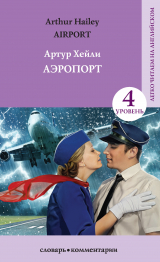
Текст книги "Аэропорт / Аirport"
Автор книги: Артур Хейли
Жанр:
Иностранные языки
сообщить о нарушении
Текущая страница: 3 (всего у книги 3 страниц)
10
The meeting of Meadowood citizenry started later than planned, since most of the six hundred adults who were present had had to battle their way, in cars and on foot, through deep snow. But somehow they came and were unanimously angry.
First they were angry with the thunderous noise of jet propulsion. The second reason was that those assembled had been unable to hear one another so far.
Some difficulty in hearing had been anticipated, and a portable p.a. system had been borrowed from the church. What had not been expected, however, was that tonight jet aircraft would be taking off immediately overhead.
In a momentary silence the chairman, a balding man named Floyd Zanetta, who was a printing firm manager, shouted, “Ladies and gentlemen, for years we have tried reasoning with the airport management and the airline companies. What do the airport and airlines do? I’ll tell you. They pretend to listen. And they make promises, but they are only liars…”
The word “liars” was lost in an unbelievable crescendo of sound. A few glanced upward nervously.
The roar lessened and faded. Already miles away and several thousand feet above, Flight 58 of Pan American was climbing through storm and darkness, reaching for higher, clearer altitudes. Other flights, already in line on an adjoining taxiway, were waiting their turn to follow.
Zanetta continued hastily, “I said they are liars…”
“Mr. Chairman,” a woman’s voice cut in from the body of the hall, “going over it again won’t change anything. What can we do?”
Zanetta said irritably, “If you’ll kindly let me finish…”
He never did. Once again, the same encompassing roar dominated the Sunday school hall.
Then Zanetta continued speaking…
Elliott Freemantle, a lawyer seated beside Zanetta, fidgeted. He re-crossed his legs, observing his two-hundred dollar alligator shoes. Elliott Freemantle had long ago discovered that people preferred their lawyers—unlike their doctors—to look prosperous. Prosperity in a lawyer conveyed an aura of success.
Freemantle had read about the community’s problem and promptly arranged, through contacts, to have his name suggested to several homeowners as the one lawyer who could most likely help them. As a result, a homeowners committee eventually approached him. Meanwhile, he had made a superficial study of the law, and recent court decisions, affecting noise and privacy – a subject entirely new to him – but when the committee arrived, he addressed them with the assurance of a lifetime expert. Later, he had made the proposition which resulted in this meeting tonight, and his own attendance.
Zanetta, the chairman, was saying, “…and so it is my privilege and pleasure to present…”
Elliott Freemantle bounded to his feet. “If you are expecting sympathy from me, you can leave right now, because there won’t be any. My business is law and nothing else.”
He had deliberately made his voice harsh. He had also seen the newspaper reporters look up and pay attention. Good! Cooperation with the press ranked high in any project of Elliott Freemantle’s.
“If we decide, between us, that I am to represent you, it will be necessary for me to ask you questions about the effect of airport noise on your homes, your own physical and mental health. But you may as well know that whatever I learn, and however deeply I become involved, I don’t lose sleep about the welfare of my clients when I’m away from my office or the courts. But…” Freemantle paused dramatically. “But, in my office and in the courts, if we work together, I promise you will be glad I am on your side and not against you.”
Elliott Freemantle sensed early that these people were weary of sympathy. His own words, blunt and brutal, were like a cold, refreshing douche. Now, the moment for specifics had arrived—tonight, for this group, a discourse on the law of noise.
The law of noise, he declared, was increasingly under study by the nation’s courts. Old concepts were changing. New court decisions were establishing that excessive noise could be an invasion of privacy. Courts were in a mood to grant financial recompense where intrusion could be proven.
The United States Supreme Court, he went on, had already set a precedent, and he described the precedent in detail. He then added that elsewhere, more and more similar cases were being argued in the courts. Mention of a specific sum—ten thousand dollars—evoked immediate interest, as Elliott Freemantle intended that it should.
The entire presentation sounded authoritative, factual, and the product of years of study. Only Freemantle himself knew that his “facts” were the result of two hours, the previous afternoon, spent studying newsclippings.
The only thing that Freemantle wanted was this Meadowood homeowners group as clients—at a whopping fee.
It was remarkable what you could accomplish with audacity, particularly when people were white hot in pursuing their own interests. An ample supply of printed retainer forms was in his bag.
“There is little time. Legal action should be begun at once, before the airport, by perpetuation of noise over a period of years, could claim custom and usage.”
Near the front of the audience, a youngish man in hopsack slacks sprang to his feet. “By God!—tell us how we start.”
“You start—if you want to—by retaining me as your legal counsel.”
It had worked, as Elliott Freemantle had known it would.
He would give them value for their money—a good show, with fireworks, in court and elsewhere. Now that his own involvement was assured, he wanted to cement the relationship by staging the first act of a drama.
The actors in the drama would be the residents of Meadowood, here assembled.
The scene would be the airport.
The time: tonight.
11
At approximately the same time D. O. Guerrero was surrendering to failure.
D. O. Guerrero was a gaunt man, slightly stoop-shouldered, with a protruding, narrow jaw, deep-set eyes, pale thin lips, and a slight sandy mustache. His age was fifty; he looked several years older.
He had been married for eighteen years. By some standards, the marriage was good. But in the past year, a mental gulf had opened between the Guerreros which Inez, though she tried, was unable to bridge. It was one result of a series of business disasters which reduced them to near poverty, and eventually forced a succession of moves, including the one to this drafty, cockroach-infested, two-room apartment.
A few weeks ago, in a rage, he had struck Inez. She feared more violence and, soon after, sent their two teen-age children to stay with her married sister in Cleveland. Inez herself stayed on, taking a job as a coffee-house waitress, and the work at least provided money for food.
Inez was now at her job. D. O. Guerrero was in the apartment alone.
He held a confirmed reservation, plus a validated ticket—for tonight—on Trans America Flight Two to Rome. Inez had no knowledge of the ticket to Rome.
The Trans America ticket was for a round trip excursion which normally cost four hundred and seventy-four dollars. However, by lying, D. O. Guerrero had obtained credit. He had paid forty-seven dollars down, acquired by pawning his wife’s last possession of any value—her mother’s ring.
He had avoided a credit investigation by typing deliberately misspelling his surname, changing the initial from “G” to “B,” so that a routine consumer credit check of “Buerrero” would produce no information, instead of the harmful data recorded under his correct name.
In any case, when checking in at the airport later tonight, he intended to have the spelling corrected—on the Trans America flight manifest as well as on his ticket.
Another part of D. O. Guerrero’s plan was to destroy Flight Two by blowing it up.
His own life was useless, his death, though, could be of value, he intended to make sure it was.
Before departure of the Trans America flight, he would take out flight insurance for seventy-five thousand dollars, naming his wife and children as beneficiaries. He believed that what he was doing was a deed of love and sacrifice.
D. O. Guerrero had selected Trans America’s non-stop flight to Rome, because he reasoned, his own plan must preclude the recovery of wreckage. A large portion of the journey of Flight Two—The Golden Argosy—was above ocean.
Guerrero calculated that after four hours’ flying Flight Two would be over mid-Atlantic. A finger through the loop, a tug on the string! And the explosion would be instant, devastating, final, for whomever or whatever was nearby. It would send the aircraft, or what remained of it, plummeting toward the sea. The debris of Flight Two would remain forever, hidden and secret, on the Atlantic Ocean floor.
Flight insurance claims—in the absence of any evidence of sabotage—would be settled in full.
It was a few minutes after 8 P.M.
One final thing to do! A note for Inez.
I won’t be home for a few days. I expect to have some good news soon which will surprise you. D.O.
It wasn’t much of a note to mark the end of eighteen years of marriage but it would be a mistake to say too much. Afterward, even without wreckage from Flight Two, investigators would put the passenger list under a microscope.
Part Two
8:30 P.M. – 11 P.M. (CST)
1
Once more, Joe Patroni returned to the warmth of his car and telephoned the airport. The Aéreo-Mexican 707 was still stuck in mud out on the airfield. His help was needed urgently.
At the moment, the scene around the wrecked tractor-trailer transport looked like a staged disaster for a wide screen movie. The arrival of a TV camera crew, a few minutes earlier, had heightened the stage effect.
Before he left to make his telephone call, Joe Patroni had carefully coaxed the tow trucks into locations which would give them the best leverage, together, to move the disabled tractor-trailer. As he left, the truck drivers and helpers were connecting heavy chains which he knew would take several more minutes to secure. But now, incredibly, the chains were removed, except for one which a grinning tow truck operator was handling as a portable TV camera focused on him.
“Who in hell changed the trucks? The way they’re lined now, all they’ll do is pull each other.”
“I know, Mister.” The lieutenant appeared fleetingly embarrassed by Patroni’s words. “But the TV guys wanted a better shot.”
“You just blocked this road an extra twenty minutes. It took ten minutes to locate those trucks where they should be; it’ll take another ten to get them back.”
“Now listen, mister. We’re glad to have help, including yours. But I’m the one who’s making decisions.”
“No!—you listen to me.” Joe Patroni stood glaring. “There’s an emergency at the airport. I already explained it; and why I’m needed there. There’s a phone in my car. I can call my top brass, who’ll call your brass, and before you know it, somebody’ll be on that radio of yours asking why you’re polishing your TV image instead of doing the job you’re here for. So, do I call in, or do we move?”
Конец ознакомительного фрагмента.
Текст предоставлен ООО «ЛитРес».
Прочитайте эту книгу целиком, купив полную легальную версию на ЛитРес.
Безопасно оплатить книгу можно банковской картой Visa, MasterCard, Maestro, со счета мобильного телефона, с платежного терминала, в салоне МТС или Связной, через PayPal, WebMoney, Яндекс.Деньги, QIWI Кошелек, бонусными картами или другим удобным Вам способом.








